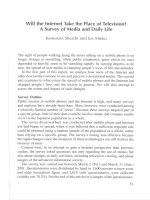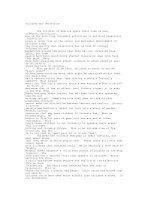26123 television addiction
Bạn đang xem bản rút gọn của tài liệu. Xem và tải ngay bản đầy đủ của tài liệu tại đây (133.83 KB, 5 trang )
)
-
1
Television addiction
Among American children, television ranks second as a consumer of hours. The average American, both child and
adult, watches more than six hours T.V daily.
What effects does habitual viewing on children? Wilkins gives, as example, studies that have reported a relationship
between watching and decreased learning, between violence on T.V and aggressive behavior. Wilkins approvingly
refers to a famous psychologist who once said: “The danger of T.V lies not so much in the behaviour it produces but in
the behaviour it prevents.” Some examples: communication between parent and child, the capacity to entertain
oneself, the ability to express ideas logically… T.V, suggests Wilkins, doesn’t cut children from reality, it becomes
their reality.
What are the signs of addiction? According to Wilkins, there are some key clues. Do the children come straight home
from school and turn T.V on? Do they watch more than ten hours a week? For many parents, many of the same
symptoms are true.
Earlier this year, Wilkins conducted an abstinence which lasted a week and it was with elementary school kids in
Ridgewood. Several frustrated mothers furtively watched their favourite programs. In general, parents seemed to
suffer from not watching T.V more actually than their children.
It was T.V critic Michael Arlen who said that television connects viewers to nothing except the idea of being
connected to something. Wilkins’ advice: to reconnect yourself to the world, disconnect the set.
Questions:
Tick the right answer:
Excessive TV viewing by adults.
Bad TV programs for children and adults.
Excessive TV viewing by children.
) Fill in this chart with reference o the text. Mention two effects on children and one on adults.
Effects of habitual viewing
On children
1……………………………………………
…………………………………………….
2……………………………………………
……………………………………………..
On adults
1…………………………………………….
………………………………………………
) Tick the right box to indicate whether the following statements are true or false. Then, justify your answers with
details from the text.
Statements
Wilkins’ experience with families proved that
children are more addicted to TV than adults.
True
False
According to Wilkins, excessive TV watching
increases the aggressive behaviour among
children.
Justification
…………………………………
…………………………………
…………………………………
…………………………………
…………………………………
…………………………………
) Find in the text a synonym to “television is just an illusion”
……………………………………………………………………………………………………….
2
) Explain the following sentence: “the danger of TV lies not so much in the behaviour it produces but in the behaviour it
prevents”.
……………………………………………………………………………………………………….
) Find words that mean:
Watching:…………………..
Ability:……………………..
Signs:……………………….
Doing something secretly and quietly in order not to be noticed:……………………..
Children:…………………
Turn off:…………………..
Pair work:
Questionnaire: in the right is a list of 10 types of TV programs. Put a tick in the appropriate column to show how
much you like each one. Below is a list of 14 adjectives commonly used to express opinions about films or TV
programs. Sort them out into two groups, one negative and the other is positive. Then use them to explain your
preferences to other students (at least 3 sentences).
Program type
12345678910-
Like very much
Like
Indifferent
Don’t
like
Dislike very much
News
Documentary
Drama
Comedy
Films
Quiz show
Sport
Current affairs
Serials
Music (all types)
(Boring – interesting – complicated – violent – depressing – romantic – old-fashioned – funny – entertaining – truthful
– exciting – sentimental – informative – superficial)
1. ……………………………………………………………………………………………………
2. ……………………………………………………………………………………………………
3. ……………………………………………………………………………………………………
4. ……………………………………………………………………………………………………
5. ……………………………………………………………………………………………………
Grammar:
) Fill in the blanks with words from the box (there are 2 extra words):
Starving – health – malnutrition – children – hunger – global – malnourished – leads – these.
Televised images of………………….children have brought the problem of…………………….hunger home to people
in rich countries. Sadly, however, the problem is far deeper than an immediate lack of food. Around a billion person
are……………...that is deplorable human tragedy which………………..to measurable economic losses, hence
poverty.
Lives are shortened, causing lost production and income. Those who survive the effects of…………………may be
less productive, perhaps throughout their lives……………….
3
Also, often leaves people more susceptible to disease, so that more production has to be devoted to……………………
care.
) Put the verbs / words between parentheses in the correct tense / form.
- The English language (speak- first) ……………………….by the people who lived in England; but because they (be)
……………….great travelers and merchants, they (carry)…………………their languages abroad and it is (use)
……………………now in many countries. Because the way people speak (change – always)…………………..and
new words (invent – often)…………………….., different varieties are obviously British English and American
English. British English used to be (consider)…………………..the real thing; however, nowadays American English
(spread)…………………….faster than British English.
- Ted Hughes, the English poet, (birth)………………..in 1930. His work (characterize)……………………by its harsh
portrayal of the crueler aspects of nature, by its (reflect)………………..of the agonies of personal experience, and by
the (employ)……………….of myths of (create)…………….being.
In 1956, he (marry)…………………Sylvia Plath, the U.S poet and (novel)……………… her powerful, highly
(person)………………….poems, often expressing a sense of desolation, are distinguished by their (intense)
……………….and (sharply)……………..imagery.
Ted and Sylvia’s marriage (break)…………………..up in 1962. She (commit)………………..suicide while (live)
…………………in London.
2/ In each of the following sentences there is a mistake. Underline it then correct it:
1- Tunis is the larger city in Tunisia. ………………………………..…………….
2- Is Jane and Janet here? ………………………..……………………………….
3- Peters' wife is from France. …………………………….……………………….
4- If you not respect the rules, they punish you. ………………………………………………
5- Our teacher haven't got a car. ………………………………..………………….
6- Dublin has got traditionals buildings. …………………..…………………………….
7- My neighbour house is large. ………………………………………………………….
8- The village has got three rivers and lake. ……………………………………………….
9- Peter work as a doctor. ………………………………………………………….…….
10- They are staying in home because it is snowing.
………………………………………………………………….
Vocabulary:
Find the definition of each explanation:
1. Are you usually smiling and happy? So you are………………( R E C H F U L E )
2. Do you enjoy the company of other people? So you
cheerful
Are you usually smiling and happy?So you are *
are…………………. ( E C S A O I L B )
3. Do you find it difficult to meet new people? So you
sociable
Do you enjoy the company of other people?So you are *
4
are……………. (H Y S )
4. Is it important to you to succeed in your career? So you are
shy
Do you find it difficult to meet new people?So you are *
………………( S M I A U B I O T )
5. Does your mood change often and suddenly for no reason? So
ambitious
Is it important to you to succeed in your career?So you are *
you are ……….( Y O D O M )
6. Do you notice other people's feeling? So you are
moody
Does your mood change often and suddenly for no reason?So you are *
………………….( S E S E I V T I N )
7. Do you think the future will be good? So you are
sensitive
Do you notice other people's feeling?So you are *
…………………..( T I I S T O M I C P )
8. Can your friends depend on you? So you are
optimistic
Do you think the futur w ill be good?So you are *
……………………….(L L R B E E A I )
9. Is your room often in a mess, So you are ………………………….(
reliable
Can your friends depend on you?So you are *
NYUITD)
10. Do you get annoyed if you have to wait for anyone or
untidy
Is your room often in a mess,So you are *
anything? So you are……………….…. ( T P I T A M N I E )
11. Do you put off until tomorrow what you could do today? So you
impatient
Do you get annoyed if you have to w ait for anyone or anything?So you are *
are ……………….(Z Y A L )
12. Do you work hard? So you are ………………………( G R K R I N
lazy
AWOHD-)
Do you put off until tomorrow w hat you could do today?So you are *
5
13. Do you keep your feeling and ideas to yourself? So you are
hard-w orking
Do you w ork hard?So you are *
……………….( E R D E V E R S )
14. Do you often give presents? So you are ………………………( U
reserved
Do you keep your feeling and ideas to yourself?So you are *
EROGSNE)
15. Do you talk a lot? So you are …………………….(I L K A T A T E
generous
Do you often give presents?So you are *
V)
16. Are you usually calm and not worried? So you are
talkative
Do you talk a lot?So you are *
………………..….(G N Y S G - A E O I )









